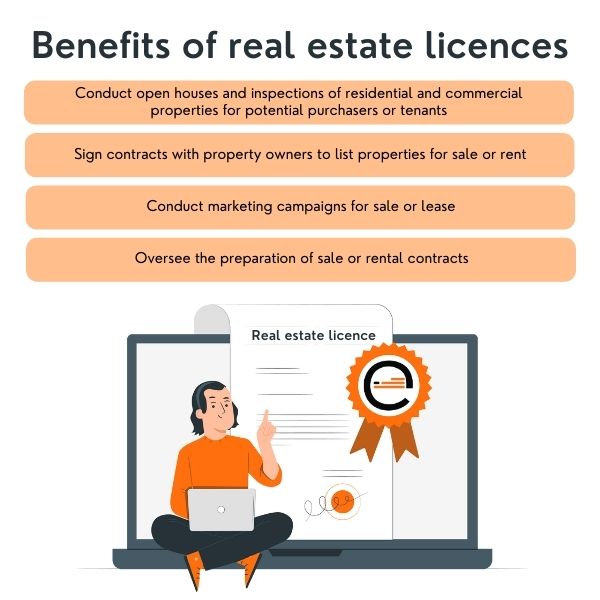It’s well known that a career in real estate can be lucrative and fun. But what qualifications are required to enter the industry as a real estate agent, property manager or leasing agent?
In Australia, real estate is a government-regulated industry. This means anyone working in a property sales or leasing role must have a licence or certificate of registration issued by the state or territory government where they wish to work. These licensing requirements will differ from state to state. But the threshold qualification you’ll need to acquire to qualify for a real estate licence anywhere in Australia is the Certificate IV in Real Estate Practice (CPP41419) course. As Australia’s leading real estate academy, Entry Education is the perfect place for you to begin your journey into real estate success!
Do you need a real estate licence in Australia?
As we have seen, each Australian state and territory maintains its own unique system of real estate licensing and registration. You’ll need to hold one of those qualifications in order to work as a real estate agent, property manager or leasing agent.
The minimum standard required to qualify as a real estate agent in all Australian jurisdictions is the Certificate IV in Real Estate Practice (CPP41419). This course consists of 18 study units that most Entry Education students complete over a few weeks.
What you can do with a Certificate IV in Real Estate Practice (CPP41419) will vary from state to state. In Queensland, this course will enable you to open your own agency. But in other states, you’ll have to do further study if you want to be your own boss.
Benefits of real estate licences
A real estate licence is a credential that demonstrates a level of expertise in the property industry to clients and prospective employers. As a licensed real estate agent, you’ll be authorised to:
- conduct open houses and inspections of residential and commercial properties for potential purchasers or tenants
- sign contracts with property owners to list properties for sale or rent
- conduct marketing campaigns for sale or lease
- oversee the preparation of sale or rental contracts
In some Australian states, a Certificate IV in Real Estate Practice (CPP41419) will enable you to become your own boss by opening your own agency. In others, additional study will be required to operate independently. Consult the government requirements in the location you want to work as a real estate professional.
Alternative career path in real estate without a licence
The real estate industry offers alternative career possibilities to those who aren’t seeking to obtain a real estate licence. These include registration as sales assistants or property managers.
Sales assistants or agent representatives (this exact job title varies from state to state) work in support roles such as office administration, sales, leasing and property management – all under the supervision of licensed real estate agents.
Another alternative qualification for people seeking a career in real estate is property management. Property managers are responsible for rent collection, property maintenance and showing property to prospective renters. Real estate agencies also employ photographers and copywriters who play important roles in real estate advertising campaigns.
But while these alternative qualifications have their place in the property sector, there’s no doubt that a real estate licence is the most valuable credential for those seeking a lucrative career.
Considerations for deciding whether to obtain a real estate licence
The ultimate decision about the type of real estate qualification you want will depend on your career ambitions and life goals. Working as a real estate agent can be very rewarding, but success shouldn’t be taken for granted. At its core, real estate is a people-centric business that relies on a personal touch and customer referrals. This means networking and relationship-building are central to your success.
Building relationships that bring in property listings takes a lot of face-time with colleagues and clients, often outside business hours. And most auctions and open houses take place on weekends. All of this means that the most successful real estate agents spend a lot more time on the job than the average employee. Of course, the rewards can be greater as well – but that creates a work-life question that only you can answer.
Different types of real estate licences in Australia
The type of real estate licence you need will depend entirely on where you want to work. This is because each Australian state and territory has its own system of regulation for the real estate industry.
For example, there are two classes of real estate licence in NSW. A Class 2 licence enables you to work as an agent employee while a Class 1 licence authorises you to own and manage your own agency. Studying real estate in Victoria is similar. However, in Queensland there is only one type of real estate licence. Once you’ve received your real estate licence from the Queensland Office of Fair Trading, you can either work as an employee for someone else or open your own agency. You can study for an auctioneer’s licence as well.
Get in touch with Entry Education about your career goals in the real estate industry. We know everything you’ll need to succeed and we’re always pleased to help.
Wrapping up
So by now you should have a good idea about the available options for a career in the Australian real estate industry. If you’re a people person who is self-motivated and prepared to put in the effort, working as a real estate agent can be fulfilling and lucrative.
Entry Education is a Registered Training Organisation (RTO 41529) that provides the best real estate training in the business. We measure our success by the success of our students and we’re here to help you reach your goals.
Sound interesting? We’re just a phone call or email away.
Call us on 1300 799 447, or write to us at reception@entryeducation.edu.au.
We look forward to hearing from you!















